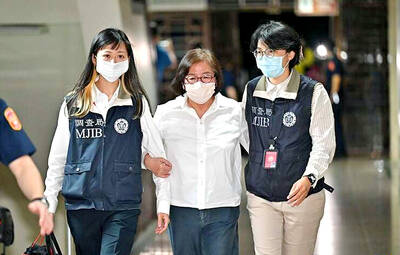Labor groups yesterday panned the Ministry of Education (MOE) over a government-sponsored college student internship program, saying that the program would only make the unemployment situation worse.
As part of a project to stimulate the economy through increasing domestic demand to be reviewed by the legislature today, the ministry would spend NT$12 billion (US$354 million) to subsidize businesses that hire college students as interns.
The plan is for college students on the internship program to receive NT$22,000 per month from the ministry for up to a year. The ministry estimates that 35,000 college students will benefit from the program.
However, labor activists voiced concern at a press conference yesterday that the program would not help college students become more competitive in the job market after graduation and that the plan would exacerbate the unemployment situation.
“Basically, businesses will get free, disposable workers paid for by the government to work for them for a year. After the one-year internship is over, they’ll just replace them with new interns for free,” said Liu Yu-hsueh (劉侑學), a Youth Labor Union 95 member. “If companies can get free workers, why hire new employees?”
Liu said that some companies might even fire employees and get interns to fill the vacancies.
“Of course the MOE said that they have measures to prevent companies from doing this, but they will use legal means, such as moving unwanted employees to other positions or cutting their pay and forcing them to resign,” Liu said. “I’ve compared the internship positions being offered by businesses and positions in their own job ads. They are almost the same.”
Liu also questioned whether the internship program would be useful to college students, as most jobs offered would be low-skilled jobs, such as parking lot attendants, truck drivers or customer service specialists.
Taiwan Labor Front secretary-general Son Yu-lian (孫友聯) criticized the ministry’s plan as a waste of money.
“I want to remind MOE officials that the NT$12 billion is borrowed money and should be spent more wisely,” Son said.
Instead of benefiting students as the ministry intends, the internship program would only benefit businesses and employment agencies, he said.
“Some of the employment agencies have already set up special ‘hire for free’ pages on their Web sites,” Son said.
Taiwan Confederation of Trade Unions deputy secretary-general Jill Huang (黃吉伶) urged the ministry not to meddle in the employment market.
“Employment is a very complicated issue and that’s why the Council of Labor Affairs created a special agency to take care of it — and even it’s not doing a very good job, despite its professionalism,” Huang said. “The MOE should not try to get involved in issues it’s unfamiliar with.”
In response, MOE Technological and Vocational Education Department official Chang Chung-hsin (章忠信) said the ministry would make sure schools establish a strict screening process when choosing companies for student internships.
Chang said the ministry would request that companies offering internship programs to students provide consultation and guidance to the interns and the firms would be told that they should not lay off interns within the first three months of the program.
ADDITIONAL REPORTING BY FLORA WANG

Costa Rica sent a group of intelligence officials to Taiwan for a short-term training program, the first time the Central American country has done so since the countries ended official diplomatic relations in 2007, a Costa Rican media outlet reported last week. Five officials from the Costa Rican Directorate of Intelligence and Security last month spent 23 days in Taipei undergoing a series of training sessions focused on national security, La Nacion reported on Friday, quoting unnamed sources. The Costa Rican government has not confirmed the report. The Chinese embassy in Costa Rica protested the news, saying in a statement issued the same

Taiwan is to extend its visa-waiver program for Philippine passport holders for another year, starting on Aug. 1, Minister of Foreign Affairs Lin Chia-lung (林佳龍) said on Friday. Lin made the announcement during a reception in Taipei marking the 127th anniversary of Philippine independence and the 50th anniversary of the establishment of the Manila Economic and Cultural Office (MECO) in Taiwan, the Ministry of Foreign Affairs said. The decision reflected Taiwan’s commitment to deepening exchanges with the Philippines, the statement cited Lin as saying, adding that it was a key partner under the New Southbound Policy launched in 2016. Lin also expressed hope

Temperatures in New Taipei City’s Sindian District (新店) climbed past 37°C yesterday, as the Central Weather Administration (CWA) issued heat alerts for 16 municipalities, warning the public of intense heat expected across Taiwan. The hottest location in Taiwan was in Sindian, where the mercury reached 37.5°C at about 2pm, according to CWA data. Taipei’s Shilin District (士林) recorded a temperature of 37.4°C at noon, Taitung County’s Jinfeng Township (金峰) at 12:50 pm logged a temperature of 37.4°C and Miaoli County’s Toufen Township (頭份) reached 36.7°C at 11:40am, the CWA said. The weather agency yesterday issued a yellow level information notice for Taipei, New

CASE: Prosecutors have requested heavy sentences, citing a lack of remorse and the defendants’ role in ‘undermining the country’s democratic foundations’ Five people affiliated with the Chinese Nationalist Party (KMT), including senior staff from the party’s Taipei branch, were indicted yesterday for allegedly forging thousands of signatures to recall two Democratic Progressive Party (DPP) lawmakers. Those indicted include KMT Taipei chapter director Huang Lu Chin-ru (黃呂錦茹), secretary-general Chu Wen-ching (初文卿) and secretary Yao Fu-wen (姚富文), the Taipei District Prosecutors’ Office said in a news release. Prosecutors said the three were responsible for fabricating 5,211 signature forms — 2,537 related to the recall of DPP Legislator Wu Pei-yi (吳沛憶) and 2,674 for DPP Legislator Rosalia Wu (吳思瑤) — with forged entries accounting for